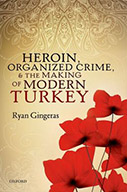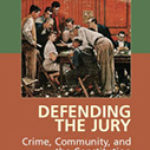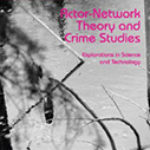Heroin, Organized Crime, and the Making of Modern Turkey

Author: Ryan Gingeras
Publisher: Oxford, UK; New York: Oxford University Press, 2014. 320p.
Reviewer: Sule Toktas | March 2015
Heroin, Organized Crime and the Making of Modern Turkey is a book on organized crime in Turkey with a historical approach that covers the period starting from the Ottoman Empire and ending in the 1970s, with a short elaboration of the contemporary era in the conclusion section. The author of the book, Ryan Gingeras, is an academic at the Naval Postgraduate School in the U.S.A.
The first chapter of the book introduces readers to the ‘Turkish Mafia,’ and traces the historical origins of the development of the bandits and smugglers in the Ottoman Empire, and illustrates the international links of the time. The second chapter focuses on the First World War and on the Early Republican Era of modern Turkey. Gingeras, in the second chapter, again by setting the opium and heroin trade in an international setting, provides information on the collaboration of the Turkish state with the US government in dealing with matters of the drug trade. The third chapter of the book gives a profile of Turkey, where geographically, the mafia transactions are connected from the Middle East, i.e. Iran, Lebanon, etc., to the Balkans, Europe and the USA. Chapter four focuses on the state efforts in combatting transnational organized crime, and as part of national security, the counter-narcotics operations and intelligence gathering. The 1970s is a special period in Turkish history, due to the crisis between the USA and Turkey regarding opium production. Chapter five provides insight into this special time period in Turkish-American relations. The emergence of a new profile of mafia leaders in Turkey is then among the subjects of the conclusion section.
The title of this book is creative in the sense that there is a link built among heroin, organized crime and the making of modern Turkey. Yet, when the making of modern Turkey is subject to analysis, especially in the field of political science, the link is usually built around the state institutions, law, politics, democracy, democratization, state-society relations and civil society. Therefore, when drugs and modern Turkey are linked in the logic of the ‘making of modern Turkey,’ one questions the validity and correctness of the title from the perspective of political science — as it has the potential of being a misleading use of terms and concepts. In other words, one questions how detrimental that terms like opium, heroin, transnational organized crime, etc. are in discussing the making of a country or a state. Additionally, the author has primarily used American archives in research, and one might wonder whether the history in the book would be the same if Turkish archives were to be used. Last but not least, transnational organized crime has also changed its profile over the years. For example, human smuggling and trafficking are some of the crimes on which international networks are frequently collaborating. This makes one wonder therefore about the scope of the connection between drug trafficking and human trafficking as well.
Sule Toktas is a professor of political science at Kadir Has University, Department of Political Science and Public Administration, Istanbul, Turkey.


